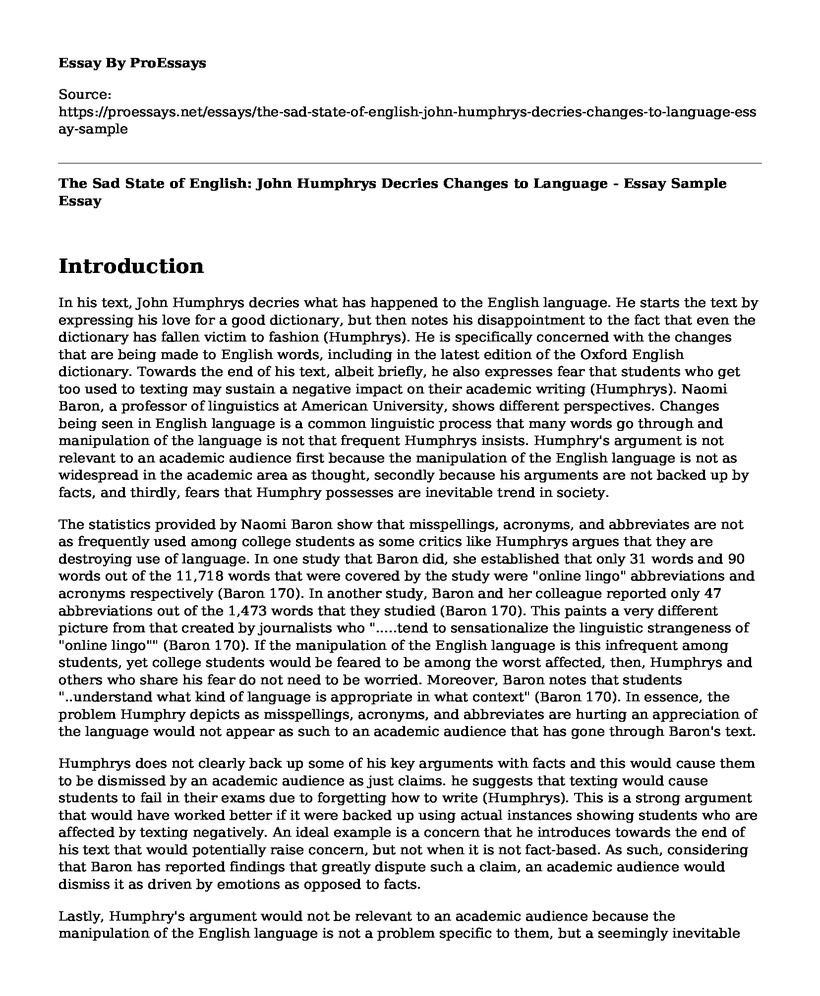Introduction
In his text, John Humphrys decries what has happened to the English language. He starts the text by expressing his love for a good dictionary, but then notes his disappointment to the fact that even the dictionary has fallen victim to fashion (Humphrys). He is specifically concerned with the changes that are being made to English words, including in the latest edition of the Oxford English dictionary. Towards the end of his text, albeit briefly, he also expresses fear that students who get too used to texting may sustain a negative impact on their academic writing (Humphrys). Naomi Baron, a professor of linguistics at American University, shows different perspectives. Changes being seen in English language is a common linguistic process that many words go through and manipulation of the language is not that frequent Humphrys insists. Humphry's argument is not relevant to an academic audience first because the manipulation of the English language is not as widespread in the academic area as thought, secondly because his arguments are not backed up by facts, and thirdly, fears that Humphry possesses are inevitable trend in society.
The statistics provided by Naomi Baron show that misspellings, acronyms, and abbreviates are not as frequently used among college students as some critics like Humphrys argues that they are destroying use of language. In one study that Baron did, she established that only 31 words and 90 words out of the 11,718 words that were covered by the study were "online lingo" abbreviations and acronyms respectively (Baron 170). In another study, Baron and her colleague reported only 47 abbreviations out of the 1,473 words that they studied (Baron 170). This paints a very different picture from that created by journalists who ".....tend to sensationalize the linguistic strangeness of "online lingo"" (Baron 170). If the manipulation of the English language is this infrequent among students, yet college students would be feared to be among the worst affected, then, Humphrys and others who share his fear do not need to be worried. Moreover, Baron notes that students "..understand what kind of language is appropriate in what context" (Baron 170). In essence, the problem Humphry depicts as misspellings, acronyms, and abbreviates are hurting an appreciation of the language would not appear as such to an academic audience that has gone through Baron's text.
Humphrys does not clearly back up some of his key arguments with facts and this would cause them to be dismissed by an academic audience as just claims. he suggests that texting would cause students to fail in their exams due to forgetting how to write (Humphrys). This is a strong argument that would have worked better if it were backed up using actual instances showing students who are affected by texting negatively. An ideal example is a concern that he introduces towards the end of his text that would potentially raise concern, but not when it is not fact-based. As such, considering that Baron has reported findings that greatly dispute such a claim, an academic audience would dismiss it as driven by emotions as opposed to facts.
Lastly, Humphry's argument would not be relevant to an academic audience because the manipulation of the English language is not a problem specific to them, but a seemingly inevitable trend in society. Here, it is worth noting that Baron emphasizes the inevitability of the changes being seen in the English language and keeps from blaming them on the influence of new media. She uses the example of the word "newspaper", which according to her and similar to many other words, began as two words ("news" and "paper") before progressing to having a hyphen ("news-paper") before finally becoming a single word ("newspaper") (Baron 171). If this is the case, what is happening to words like "pigeonhole" (formerly in the dictionary as "pigeon-hole") and "leapfrog" (formerly "leap-frog"), as noted by Humphrys, may simply be a normal process as opposed to a concern for academic audiences. An academic audience would thus most likely dismiss Humphry's argument especially considering the "whatever" attitude they hold, which makes them care less as long as the meaning of the words remain. They would rather appreciate creativity shown in sentences than correctness of every single word.
Conclusion
In conclusion, Humphry's argument would not be relevant to an academic audience particularly if that audience has gone through Baron's essay. According to Baron, study findings show that the problem of manipulation of the English language is not as frequent and that the modification of words is actually a normal stage that many words go through. Worse still, Humphrys did not sufficiently back up some of his major arguments with facts such as those coming from studies and this makes their credibility questionable.
Works Cited
Baron, Naomi. "Are Digital Media Changing Language?". Language Diversity and Academic Writing, edited by Samantha Looker- Koenings, Bedford, 2018, pp. 170-76
Humphrys, John. "I h8 txt msgs: How texting is wrecking our language". Mail Online, Sep.24,2007, https://www.dailymail.co.uk/news/article-483511/I-h8-txt-msgs-How-texting-wrecking-language.html
Cite this page
The Sad State of English: John Humphrys Decries Changes to Language - Essay Sample. (2023, Feb 27). Retrieved from https://proessays.net/essays/the-sad-state-of-english-john-humphrys-decries-changes-to-language-essay-sample
If you are the original author of this essay and no longer wish to have it published on the ProEssays website, please click below to request its removal:
- Essay Sample on Hamlet Soliloquy Analysis
- Essay Example on the Double in Kafka's Metamorphosis
- Analysis of Dis Poetry by Benjamin Zephaniah Essay
- Essay on MTV: Music, Controversy, and a Legacy of Youth Networking.
- Business Letters vs Social Media Posts - Essay Sample
- The Benefits and Challenges of Social Media for Sales and Marketing - Essay Sample
- Songs Reflect, Depict and Impact Los Angeles - Essay Sample







